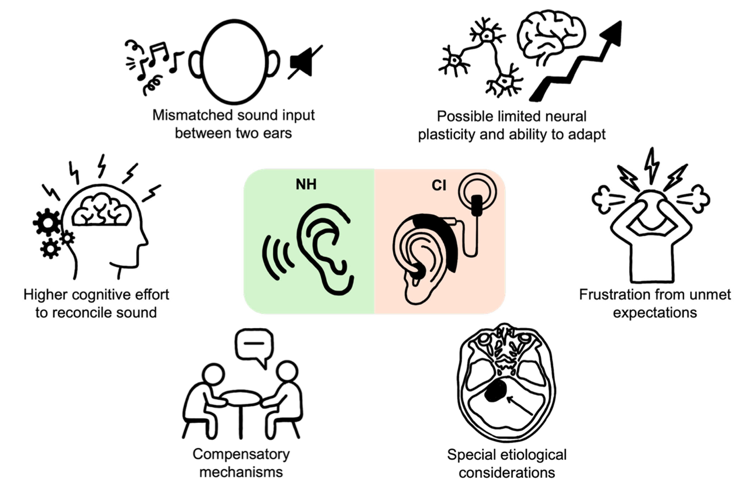A review by 2024–2025 ERG scientist Nicole T. Jiam, M.D., and team finds that while cochlear implant users with single-sided deafness often perform well on speech tests thanks to their healthy ear, these results mask real-world difficulties. They recommend using more sensitive measures, such as music perception, to better assess outcomes. Jiam is the recipient of an Elizabeth M. Keithley, Ph.D. Early Stage Investigator Award, generously supported in part by Susan and Steve Kaufman.
Image: The unique challenges faced by cochlear implant users with single-sided deafness include mismatched sound input between the ears and higher cognitive effort. Credit: Lin et al./Journal of Personalized Medicine
Request for Proposals: Our fiscal year 2027 ERG application cycle has opened!
NEW THIS YEAR: Letters of Intent are due by December 5.
Selected applicants will be invited to submit full proposals in the spring.
Meet the Researchers: Learn about the inspirations and motivations behind our 2026 Emerging Research Grants scientists, eight first-year recipients and six second-year recipients.
Webinar recaps: 2018 ERG scientist A. Catalina Vélez-Ortega, who was generously funded by Cochlear Americas, on cochlear supporting cells; and a webinar panel hosted by our partner Hyperacusis Research, featuring 2022–2023 ERG scientist Megan Beers Wood, Ph.D., generously funded by Hyperacusis Research
In addition, 2022-2023 ERG scientist Subong Kim, Ph.D., shares how he got his start with ERG.
Recent Research Updates From ERG Alumni:
Human ability to focus on specific sounds not found to originate in auditory nerve or brainstem, coauthored by 2013 ERG scientist Ross Maddox, Ph.D., who was generously funded by Royal Arch Research Assistance (RARA)
Exploring how children with hearing loss learn to speak, with 2022 ERG scientist Matthew Masapollo, Ph.D.
DB-OTO gene therapy for inherited deafness, whose coauthors include ERG scientists Lawrence Lustig, Ph.D. (2002), and William J. Riggs, Ph.D. (2019, generously funded by RARA)
The 25-year incidence and progression of hearing loss in the Framingham Offspring Study, coauthors include HHF board members Judy Dubno, Ph.D., and Sharon Kujawa, Ph.D., who are also ERG alumni
Plus:
ADVERTISEMENTS
Opinions Needed: Gene Therapy for Hereditary Hearing Loss
Do you have hearing loss or are you a parent of someone who does? A graduate student at The Ohio State University is conducting a study on what individuals and families think about new gene therapy treatments for hearing loss. The anonymous survey takes ~15 to 20 minutes. Participants can enter to win 1 of 25 Amazon e-gift cards each worth $30. Please visit this link to take the survey. Questions? Email connor.shemenski@osumc.edu.
Hamilton CapTel: See What They Say®
Staying connected with what matters most shouldn’t be a struggle—it should be as easy as saying hello. Hamilton® CapTel® Captioned Telephone solutions for home, work, or on the go transform the way you experience phone conversations. It’s powered by more than two decades of trusted captioning technology that’s helped connect millions of calls—all at no cost for people with hearing loss! To learn more, visit HamiltonCapTel.com.
Around the Web:
Countries with highest reported levels of hearing loss have lowest use of hearing aids (EurekAlert) and empowering employment success with hearing loss (Hearing Loss Association of America)
The “smart home” myth: why current tech fails the hearing loss community (Vocal Media)
Scientists discover a hidden gene mutation that causes deafness—and a way to fix it (Science Daily), study finds possible treatment to prevent TMPRSS3 hearing loss (The Hearing Review), and a first-of-its-kind treatment for brain-based hearing loss (CU Anschutz)
The impact of noise pollution on health (BMJ), platform protects musicians’ hearing with real-time data (The Hearing Review), and use hearing protection with your AirPods Pro 2 or AirPods Pro 3 (Apple)
Tinnitus severity linked to mood, sleep, and personality (American Academy of Audiology)
“Jeopardy!” contestant competes on show after losing hearing (TV Insider) and a review of Rachel Kolb's memoir, “Articulate” (KatherineBouton.com)
Neuroscience finds musicians feel pain differently from the rest of us (The Conversation), auditory processing differences impact learning through music (Bioengineer.org), and why the brain feels the beat better through sound than touch plus touch amplifies emotional power of sound (Neuroscience News)
When a hearing aid is not enough (The New York Times) and innovative cochlear implant trial expands earlier than expected (Medical University of South Carolina)
How babies learn language, and what parents can do to help (University of British Columbia) and when communication could mean life or death (The Harvard Gazette)
Your brain hears sounds differently when you’re trying to focus (Earth.com) and how walking fine-tunes your hearing (PsyPost)
Products and services are not endorsed by Hearing Health Foundation. Links provided are for informational purposes only and may require registration or subscription. Links to time-sensitive events may expire.


